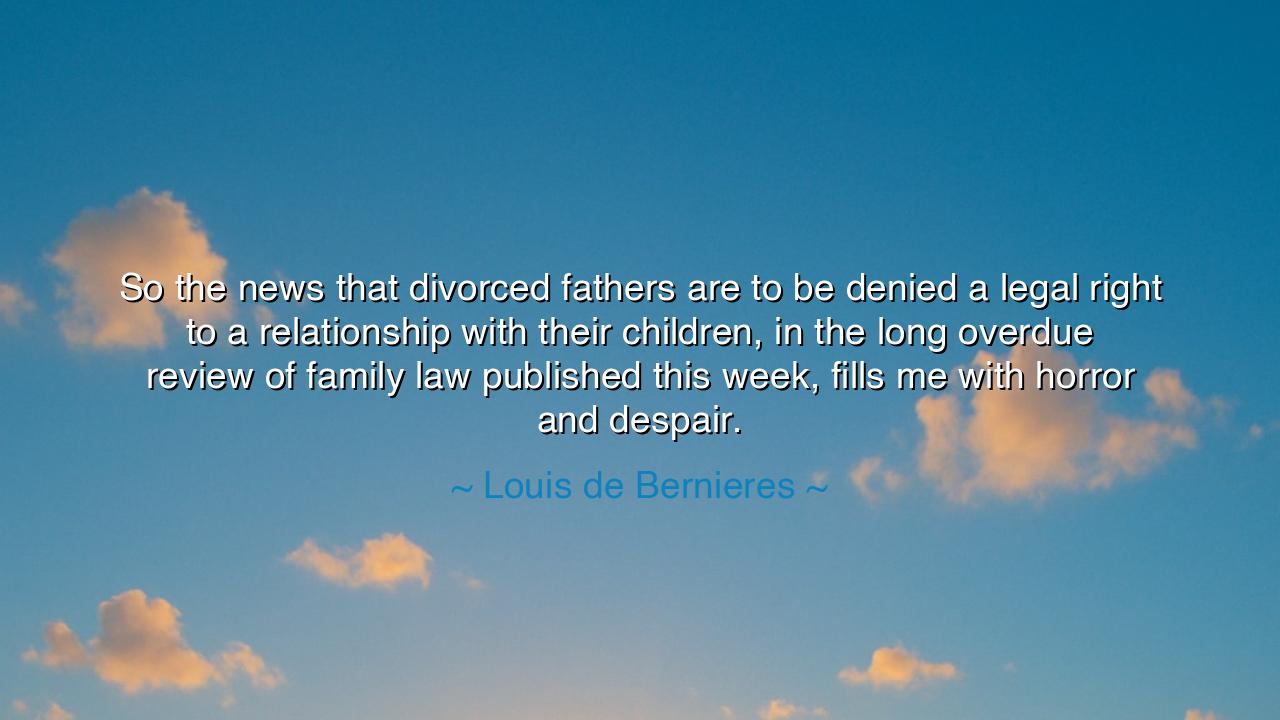
So the news that divorced fathers are to be denied a legal right
So the news that divorced fathers are to be denied a legal right to a relationship with their children, in the long overdue review of family law published this week, fills me with horror and despair.






When Louis de Bernières wrote, “So the news that divorced fathers are to be denied a legal right to a relationship with their children, in the long overdue review of family law published this week, fills me with horror and despair,” he spoke not as a novelist, but as a man wounded by the injustice of the age. Beneath his words lies a cry for balance, compassion, and the sanctity of fatherhood — a belief that the bond between parent and child should not be severed by law, nor diminished by circumstance. His tone, at once mournful and indignant, reveals the sorrow of witnessing a society that, in its pursuit of justice for some, risks inflicting quiet cruelty upon others.
The origin of this quote lies in the ongoing debates surrounding family law in modern Britain, where courts often favored mothers in custody disputes, leaving fathers — even loving, responsible ones — with limited access to their children. De Bernières, himself a man deeply attuned to the emotional landscapes of love and loss, saw in this legal tendency not merely an administrative flaw, but a moral failing. For when the state, in its cold precision, denies a parent the right to nurture, it trespasses upon the natural law of love, older and truer than any statute written by human hand. His words, therefore, are both protest and lament — a call to restore justice to the most sacred of relationships: that between father and child.
From the days of antiquity, the role of the father has been honored as one of protection, guidance, and continuity. The ancient Romans revered the paterfamilias — not for his authority alone, but for his responsibility to safeguard the family’s welfare. In the Eastern traditions, the father was seen as the anchor of discipline and wisdom, while the mother was the wellspring of tenderness. Together, they formed the dual pillars upon which the child’s world rested. When one pillar is removed, the whole structure trembles. De Bernières saw that in the modern age, this balance was collapsing — that in the name of equality or expediency, the father’s love was being treated as dispensable, when in truth, it is indispensable.
History is filled with the tragedies of children estranged from their parents by decree, war, or pride. One recalls the sorrow of King Lear, who, through blindness of heart and folly of judgment, cast away the child who loved him most. When Lear lost Cordelia, he lost not only his daughter but his peace, his wisdom, and his soul. Likewise, when societies separate fathers from their children, they do not merely divide families — they diminish the soul of a nation. For the bond between a father and his child is not just personal; it is generational, the lifeline through which values, stories, and strength are passed down. To disrupt it is to cut the roots of civilization itself.
De Bernières’s “horror and despair” are thus not exaggerated feelings, but the proper emotional response of any human heart that understands the sacredness of kinship. His grief is the grief of one who sees the law — once the shield of justice — turned into an instrument of separation. He speaks for all those fathers who, though blameless, stand outside the window of their child’s life, watching birthdays pass, letters go unread, and affections wither into silence. There is no cruelty greater than legalized loneliness, and no injustice more piercing than when love itself is deemed irrelevant in the court of man.
But within this sorrow lies a lesson for every generation: that law must serve love, not suffocate it. The law that forgets compassion is a law that corrodes the heart of the society it governs. De Bernières’s plea reminds us that the welfare of the child is not secured by the exclusion of one parent, but by the harmony of both. True justice is not blind to tenderness; it is guided by it. When family law places bureaucracy above humanity, it betrays its very purpose — for the highest form of justice is that which protects the vulnerable and honors the bonds that sustain life.
So let this teaching be passed down: no law should make an orphan of a living child. A father’s duty and a child’s right to love one another are not privileges granted by government; they are gifts of nature, sealed by the Creator, older than any nation or court. Let society therefore remember — in its reforms, in its judgments, in its laws — that to deny love is to deny life itself. And as long as the heart still yearns for connection, as long as a father still calls out to his child, the wisdom of Louis de Bernières will echo through the ages, urging mankind to restore balance where justice has faltered, and to let compassion reign where cold law has failed.






AAdministratorAdministrator
Welcome, honored guests. Please leave a comment, we will respond soon